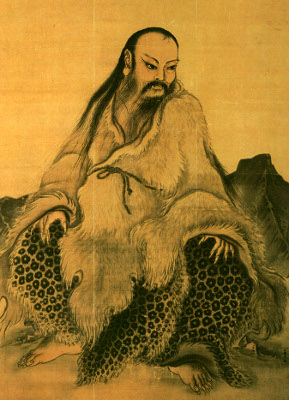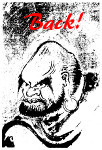Historic Origins
The origins of Taoism are diffuse, perhaps first appearing over 5,000 years ago with the teachings of Fuxi (Fu Hsi), the legendary first Chinese emperor shown above. These teachings were somewhat formalized through several sets of writings around 500 BC, at the time of the Warring States. Apparently the chaos of those times led several philosophers, such as Laozi (Lao Tsu) to attempt to devise ways where men could live in harmony, and contemporary Taoism is the synthesis of these teachers' writings. Like all religions, it has mutated into several branches, one purely philosophical (Dao Jia) and others largely Deist (Dao Jiao), those being heavily influenced by Chinese culture and folk religions. Taoism has many similarities to Zen Buddhism in that it emphasizes the individual's seeking, and it is likely that the purported 'founder' of Zen, Bodhidharma (Daruma), was heavily influenced by it. However, since the religion does not have a singular founding personality (Buddha, Christ, Mohammad, etc), its actual origin is of little importance.
The Yin and Yang
 The Taoist symbol is one of the most excellent icons ever made, in that it succinctly shows the
nature of the Tao. The circle is the Tao – everything that exists, and it is formed from forces in balance. It
does not mean that is is formed from equal portions of light and dark, or male and female, but that all
the manifestations of nature are in a dynamic balance (the intertwining shapes) and that what we think of
dualities are not pure, but greater or lesser admixtures of one another (the 'eye' spots). If we can
learn to accept that our lives are always in a state of dynamic balance (meaning temporary imbalances) and that
the division of anything into absolutely pure fractions is an illusion, then we have begun the path to
enlightenment.
The Taoist symbol is one of the most excellent icons ever made, in that it succinctly shows the
nature of the Tao. The circle is the Tao – everything that exists, and it is formed from forces in balance. It
does not mean that is is formed from equal portions of light and dark, or male and female, but that all
the manifestations of nature are in a dynamic balance (the intertwining shapes) and that what we think of
dualities are not pure, but greater or lesser admixtures of one another (the 'eye' spots). If we can
learn to accept that our lives are always in a state of dynamic balance (meaning temporary imbalances) and that
the division of anything into absolutely pure fractions is an illusion, then we have begun the path to
enlightenment.
So – what is it?
As opposed to a Deity, the Tao has no form, so it cannot be defined. The Tao is simply what exists – no more and no less. To my view, Taoism can best be described as a process, or set of loose recipes for organizing one's life, or finding your specific Tao – or path through life. Every person's Tao is unique, but since people are social creatures, some basic 'rules' are useful in smoothing out the bumps in the path; these are the 'Three Treasures' of Taoism.
Compassion
All living beings suffer at one time or another, so as social animals, we should be aware of this and attempt to mitigate suffering in others where possible, as we would appreciate the same for us. Clearly, deliberately causing suffering in others is a breach of this teaching, but what about actually mitigating the suffering of others. This begins a slippery slope; where does mitigation morph into meddling or downright coercion? The third 'Treasure' has an answer for this.
Moderation
Moderation means avoiding extremes, not necessarily leveling. When my father was teaching me how to drive, he said “The object of steering is not to keep the car in the center of the road, it is to keep it from going off of the road.”. This is to say that the best way to navigate life is to allow your path to gently wander, but not go into the ditch. Most lives, mine most definitely included, have been totally unpredictable, with great consequences arising from seemingly tiny events. In other words, our lives are in a state of chaos (a mathematical description), where the future course of events is impossible to predict; it is simply to be lived as best we can.
Humility
This does not mean humility in the sense that “I am only an insignificant so-and-so, etc”. The Taoist meaning of humility actually says “I do not have the wisdom required to tell you how you should run your life”. If only our politicians believed this... So, with this in mind, we can compassionately help others, but we are not required to – nor should we – force them to do something, even if (by our lights) it would clearly be to their benefit.
Wu-Wei – the stone in the river
Like the Tao itself, the principle of wu-wei is not easily described. It is commonly translated as “action through inaction”, which to me isn't much help. Think of it meaning that forcing one's way through life, pushing aside all obstacles to get somewhere, is not as useful as standing still and making life find its way around you. Another way of looking at it is to imagine you are a stone in a river. You are forcing the river (life) to go around you so you can enjoy the fruits of its energy. If the 'river' becomes too strong and bowls you over, simply seek a quieter location. If the flow becomes stagnant, seek a more lively spot, but in either case, let the river do the bulk of the work.
The Politics Of Taoism
The most important book of Taoist teachings is the "Tao Te Ching", or, roughly translated,“The Book of the Virtue of the Way". It is a collection of sayings, some of which seem a bit impenetrable, but others are fairly clear. Three of them regarding government and governing are:
Governing a large country
is like frying a small fish.
You spoil it with too much poking.
...............................
If you want to be a great leader,
you must learn to follow the Tao.
Stop trying to control.
Let go of fixed plans and concepts,
and the world will govern itself.
...............................
When taxes are too high,
people go hungry.
When the government is too intrusive,
people lose their spirit.
Act for the people's benefit.
Trust them; leave them alone.
Based on these and other sayings, one can say that the Tao is essentially libertarian, in that it is for a minimal government, with a wide scope for individual responsibility - and that's fine with me...

